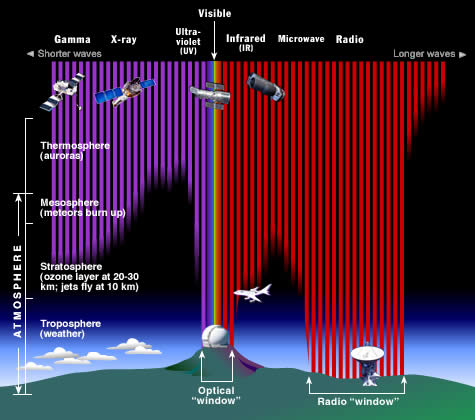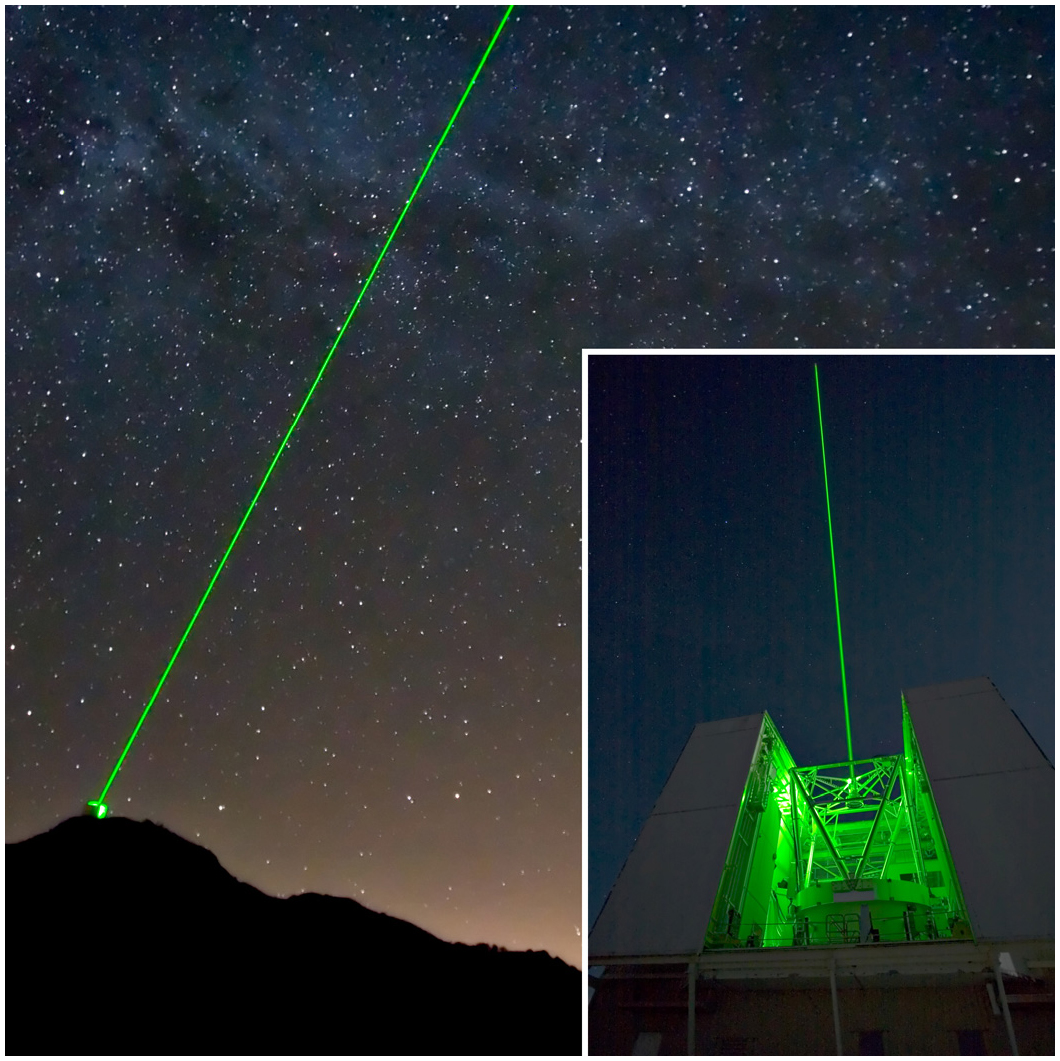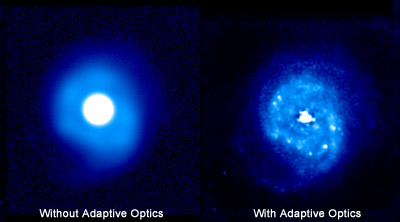It looks like you're using an Ad Blocker.
Please white-list or disable AboveTopSecret.com in your ad-blocking tool.
Thank you.
Some features of ATS will be disabled while you continue to use an ad-blocker.
share:
originally posted by: Bedlam
originally posted by: FamCore
originally posted by: irgust
a reply to: cooperton
If the stars can't be seen in space how does the hubble telescope take pictures of stars?
Can anybody answer this??? I'm very curious now. How do the camera lenses capture star light if "stars can't be seen in space"??
Of course you can see stars in space. That's what celestial imaging scopes see. Or navigational sextant scopes. The Sun is a star, as has been brought up, no problems seeing that at all.
Nope. Hubble captures starlight by long dwelling aperture, collecting lots of photons.
Someone said the 'atmosphere lights the Earth'. Uh, take a magnifying glass and hold it about a foot from a sheet of white paper. See that smoking spot? That's the Sun lighting the Earth.
originally posted by: SecretKnowledge
a reply to: cooperton
Maybe we are the only planet with the only moon revolving around the only sun in the whole universe...
Now thats a scary thought.
We already know that's wrong.
originally posted by: rickymouse
The sun does not actually light the earth, the interaction of the particles of the sun cause the sky to illuminate which then lights the earth. Now it probably would be the same with the stars, their light beams could hit the earths atmosphere and cause it to show a spot. It kind of makes you wonder how much we are not seeing.
This is incorrect.
While the atmosphere does have an effect on the types of light we can see it is pretty transparent at optical and near infrared wavelengths.
So the Sun does light the earth. We just see it through our atmosphere. Same with the stars and anything else.
Want to know what our atmosphere really filters out at various altitudes?
See the chart below:

As you can see, optical light and radio penetrate our atmosphere all the way down to the ground. This is why optical and radio astronomy were the first two forms of astronomy and why Infrared, Ultraviolet, X-Ray and Gamma Ray astronomy came later.
edit on 26-2-2015 by JadeStar because:
(no reason given)
originally posted by: Maverick7
originally posted by: 0bserver1
I think Neil just slipped tongue there.. He also looks he has to improvise on that question ...
Did you even watch the Youtube video? He clearly says he saw no stars with his eye on the Moon OR in Cis-Lunar space. A slip of the tongue would be 'we didn't see any Movie Stars on the Moon', LOL.
Cosmonaut Yuri Gagarin, the first human to (allegedly) travel in outer space in 1961, commented that the stars seen from his Vostok spacecraft were "bright and clear cut.
Somebody's lying.
Neither is lying.
They are both right. It depends on where the spacecraft (and the angle of it's window) was pointing and the time it was pointing that way.
On Earth's night side with no moon present (because it is behind you along with the Earth and the Sun) you would see stars.
Here's a challenge. Plot both Yuri Gagarin's orbit, in Celestia at the time he flew and then plot the flight of Apollo 11 to the Moon.
You'll see why one saw stars and the other didn't and be smarter in the process.
Just denying ignorance...
edit on 26-2-2015 by JadeStar because: (no reason given)
a reply to: eriktheawful
It's not necessarily the atmosphere it could well be solar radiation or the heliosphere or maybe the earth's magnetic field?
Very curious to what we would see if we traveled outside those 'fields'
It's not necessarily the atmosphere it could well be solar radiation or the heliosphere or maybe the earth's magnetic field?
Very curious to what we would see if we traveled outside those 'fields'
Doesnt the atmosphere act as a lens, as displayed by the flickering of stars?
Distorting the dot and making it your classic star shaped. And hence bigger and easier to see.
I dont know, Im not an astronomer, just guessing.
Distorting the dot and making it your classic star shaped. And hence bigger and easier to see.
I dont know, Im not an astronomer, just guessing.
If the OP's claims are correct (i can neither confirm nor deny), then perhaps it is our atmosphere that magnifies the starlight, while flitering out
the sun's radiation. That seems reasonable to me.
originally posted by: OneManArmy
Doesnt the atmosphere act as a lens, as displayed by the flickering of stars?
Distorting the dot and making it your classic star shaped. And hence bigger and easier to see.
I dont know, Im not an astronomer, just guessing.
Not so much a lens but a kind of blurry, ever changing filter.
Think of it like looking up beneath a swimming pool. You can see things but they are distorted and "watery".
In astronomy this is called atmospheric scintillation (or simply scintillation) and we astronomers HATE it.
It doesn't really make the stars bigger or easier to see it just makes them blurry/watery which is the flickering we see. Twinkle, twinkle little star, etc...
For this reason, many observatories have installed lasers which create an "artificial star" which can be used to correct for the effect of the atmosphere in the optics of the telescope. This is called Adaptive Optics (AO).

The nuclear region of the nearby galaxy NGC 7469, with and without Adaptive Optics:

edit on 26-2-2015 by JadeStar because: (no reason given)
originally posted by: JadeStar
originally posted by: OneManArmy
Doesnt the atmosphere act as a lens, as displayed by the flickering of stars?
Distorting the dot and making it your classic star shaped. And hence bigger and easier to see.
I dont know, Im not an astronomer, just guessing.
Not so much a lens but a kind of blurry, ever changing filter.
Think of it like looking up beneath a swimming pool. You can see things but they are distorted and "watery".
In astronomy this is called atmospheric scintillation (or simply scintillation) and we astronomers HATE it.
It doesn't really make the stars bigger or easier to see it just makes them blurry/watery which is the flickering we see. Twinkle, twinkle little star, etc...
For this reason, many observatories have installed lasers which create an "artificial star" which can be used to correct for the effect of the atmosphere in the optics of the telescope. This is called adaptive optics.
You have just answered a question that has been bugging me for ages.
Why is there a green laser pointing up into the sky around Greenwich way from time to time?
Id assumed it had something to do with the Dome.
Thank you.
originally posted by: OneManArmy
originally posted by: JadeStar
originally posted by: OneManArmy
Doesnt the atmosphere act as a lens, as displayed by the flickering of stars?
Distorting the dot and making it your classic star shaped. And hence bigger and easier to see.
I dont know, Im not an astronomer, just guessing.
Not so much a lens but a kind of blurry, ever changing filter.
Think of it like looking up beneath a swimming pool. You can see things but they are distorted and "watery".
In astronomy this is called atmospheric scintillation (or simply scintillation) and we astronomers HATE it.
It doesn't really make the stars bigger or easier to see it just makes them blurry/watery which is the flickering we see. Twinkle, twinkle little star, etc...
For this reason, many observatories have installed lasers which create an "artificial star" which can be used to correct for the effect of the atmosphere in the optics of the telescope. This is called adaptive optics.
You have just answered a question that has been bugging me for ages.
Why is there a green laser pointing up into the sky around Greenwich way from time to time?
Id assumed it had something to do with the Dome.
Thank you.
You're welcome. That's what I'm here for. If you have any other questions about that or astronomy in general send me a U2U.
a reply to: JadeStar
There you go again, deflating the idea we're on a stage with holes poked in the tarp above... or that light ...what... needs air to breathe?
Well, you and eons of savants who bother to make use of the eyes and brains most are supplied with at birth... or use the subsequent gifts of free education, literacy, the internet and common effin knowledge.
That's not denying ignorance... that's denying mental retardation... but carry on! You are a patient soul (assuming something termed a soul exists, that is... well at least your programming was such that you ended up patient... how's that?).
There you go again, deflating the idea we're on a stage with holes poked in the tarp above... or that light ...what... needs air to breathe?
Well, you and eons of savants who bother to make use of the eyes and brains most are supplied with at birth... or use the subsequent gifts of free education, literacy, the internet and common effin knowledge.
That's not denying ignorance... that's denying mental retardation... but carry on! You are a patient soul (assuming something termed a soul exists, that is... well at least your programming was such that you ended up patient... how's that?).
what are you saying the night sky is a holographic screen projection of a stars?
Hubble is in space and it takes pictures of many stars
Hubble is in space and it takes pictures of many stars
edit on 26-2-2015 by AthlonSavage because: (no reason given)
Actually thinking about this more, the ability to see stars is a relative effect to how much light is around us. For example during day we cant see
stars. Therefore if the sun is pointing at them in direct site they wouldn't be able to see the stars to same effect. As they move further from sun
the stars will come into view, I think a mathematical calculation could be done to show this. I would do the calc if I had time but im too absorbed on
other research calcs right now so over to someone else.
a reply to: JadeStar
Okay... I don't actually believe that.
You can never be too sure on them enternets... and juuuust in case it wasn't crystal clear, I was kidding, though I DO think some things are possible that would counter the notion I have common sense, but tarps in the sky with holes in it isn't one of them.
I was a Planetary Sciences minor at the UofA... years ago, true, but we knew a few things back then in the 80's and I still dabble. I would've been an astronomer except for the math and general lack of fashion sense that seemed required (tweed... hate me that tweed).
Okay... I don't actually believe that.
You can never be too sure on them enternets... and juuuust in case it wasn't crystal clear, I was kidding, though I DO think some things are possible that would counter the notion I have common sense, but tarps in the sky with holes in it isn't one of them.
I was a Planetary Sciences minor at the UofA... years ago, true, but we knew a few things back then in the 80's and I still dabble. I would've been an astronomer except for the math and general lack of fashion sense that seemed required (tweed... hate me that tweed).
edit on 2/26/2015 by Baddogma because: (no reason given)
a reply to: Maverick7
Maybe that's his statement of seeing stars from the moon perspective.. But there is a moment you would go through full darkness also when walking on the moon IMO.. Or they constantly are in full sunlight that I find hard to believe but maybe I'm wrong here ?
He clearly says he saw no stars with his eye on the Moon OR in Cis-Lunar space
Maybe that's his statement of seeing stars from the moon perspective.. But there is a moment you would go through full darkness also when walking on the moon IMO.. Or they constantly are in full sunlight that I find hard to believe but maybe I'm wrong here ?
a reply to: 0bserver1
Well, when he said that he knew what he was talking about and why it was so dark elsewhere. It was either the sun was already on the horizon or he was faced away from sun but towards earth which was illuminated by sun and therefore reflected the light towards his position on the moon. Either way it just made the screen too bright for him to see other stars out there.
Well, when he said that he knew what he was talking about and why it was so dark elsewhere. It was either the sun was already on the horizon or he was faced away from sun but towards earth which was illuminated by sun and therefore reflected the light towards his position on the moon. Either way it just made the screen too bright for him to see other stars out there.
I'm just gone leave this here: www.youtube.com...
That stars (or any other visible light) are invisible in space is a stupid "alternative theory", mostly propagated by Eric Dollard (and our own GaryN on ATS), and is based on misunderstanding and misrepresentation.
Plenty of astronauts and cameras have seen stars outside of the Earth's atmosphere, it just takes certain circumstances or camera settings (basically, long exposure or eye adaptation).
That stars (or any other visible light) are invisible in space is a stupid "alternative theory", mostly propagated by Eric Dollard (and our own GaryN on ATS), and is based on misunderstanding and misrepresentation.
Plenty of astronauts and cameras have seen stars outside of the Earth's atmosphere, it just takes certain circumstances or camera settings (basically, long exposure or eye adaptation).
edit on 26-2-2015 by wildespace because: (no reason given)
new topics
-
Steering the Titantic from the Drydock.
US Political Madness: 59 minutes ago -
Paramilitary Leaks - John Williams
Whistle Blowers and Leaked Documents: 10 hours ago -
Some sausage, some chicken, some sauce, some onions and some garlic...and some peppers!
Food and Cooking: 11 hours ago -
Hearing more ambulances lately
Medical Issues & Conspiracies: 11 hours ago -
Los Angeles brush fires latest: 2 blazes threaten structures, prompt evacuations
Mainstream News: 11 hours ago
top topics
-
House Passes Laken Riley Act
Mainstream News: 12 hours ago, 23 flags -
What Comes After January 20th
Mainstream News: 15 hours ago, 18 flags -
Hearing more ambulances lately
Medical Issues & Conspiracies: 11 hours ago, 7 flags -
Los Angeles brush fires latest: 2 blazes threaten structures, prompt evacuations
Mainstream News: 11 hours ago, 7 flags -
Let's Buy Greenland
General Chit Chat: 16 hours ago, 6 flags -
Those stupid GRAVITE commercials
Rant: 15 hours ago, 5 flags -
Paramilitary Leaks - John Williams
Whistle Blowers and Leaked Documents: 10 hours ago, 5 flags -
The more I think about it
General Chit Chat: 13 hours ago, 4 flags -
Canada as a state .. how would it work?
General Chit Chat: 15 hours ago, 4 flags -
Some sausage, some chicken, some sauce, some onions and some garlic...and some peppers!
Food and Cooking: 11 hours ago, 3 flags
active topics
-
Steering the Titantic from the Drydock.
US Political Madness • 1 • : andy06shake -
Canada as a state .. how would it work?
General Chit Chat • 17 • : FlyersFan -
Meta Llama local AI system is scary good
Science & Technology • 48 • : ArMaP -
-@TH3WH17ERABB17- -Q- ---TIME TO SHOW THE WORLD--- -Part- --44--
Dissecting Disinformation • 3968 • : AianawaQ1320 -
Gravitic Propulsion--What IF the US and China Really Have it?
General Conspiracies • 34 • : Lazy88 -
Let's Buy Greenland
General Chit Chat • 16 • : Freeborn -
Post A Funny (T&C Friendly) Pic Part IV: The LOL awakens!
General Chit Chat • 8000 • : KrustyKrab -
Los Angeles brush fires latest: 2 blazes threaten structures, prompt evacuations
Mainstream News • 13 • : BeyondKnowledge3 -
House Passes Laken Riley Act
Mainstream News • 16 • : KrustyKrab -
Planned Civil War In Britain May Be Triggered Soon
Social Issues and Civil Unrest • 16 • : Freeborn
